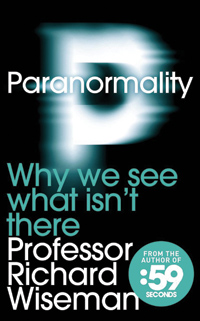You Are Browsing Resources on:
prophecy
Dr. Michael Shermer considers the characteristics of cults, how they differ from sects, religions, and myths, the role that myths and religions play in culture and people’s lives, and what Scientologists really believe.
Skepticism 101: How to Think Like a Scientist covers a wide range of topics, from critical thinking, reasoning, rationality, cognitive biases and how thinking goes wrong, and the scientific methods, to actual claims and whether or not there is any truth to them, e.g., ESP, ETIs, UFOs, astrology, channelling, psychics, creationism, Holocaust denial, and especially conspiracy theories and how to think about them.
If you missed Dr. Shermer’s previous Skepticism 101 lectures watch them now.
This book was required reading for Dr. Michael Shermer’s course, “Skepticism 101: How to Think Like a Scientist (Without Being a Geek)” taught at Chapman University during the fall 2011 semester.
“People are emotionally drawn to the supernatural. They actively want weird, spooky things to be true … Wiseman shows us a higher joy as he deftly skewers the paranormal charlatans, blows away the psychic fog and lets in the clear light of reason.”—Richard Dawkins
Richard Wiseman is clear about one thing: paranormal phenomena don’t exist. But in the same way that the science of space travel transforms our everyday lives, so research into telepathy, fortune-telling and out-of-body experiences produces remarkable insights into our brains, behaviour and beliefs. Paranormality embarks on a wild ghost chase into this new science of the supernatural and is packed with activities that allow you to experience the impossible. So throw away your crystals, ditch your lucky charms and cancel your subscription to Reincarnation Weekly. It is time to discover the real secrets of the paranormal. Learn how to control your dreams—and leave your body behind. Convince complete strangers that you know all about them. Unleash the power of your unconscious mind. —Amazon
BUY THIS BOOK
from Amazon
This PowerPoint is part of a course titled, “Perspectives on Atheism“.
This presentation demonstrates the pervasiveness of the apocalyptic worldview in contemporary popular narratives and political discourse. The psychological underpinnings of apocalyptic thinking are examined drawing on the work of literary theorist Kenneth Burke. The presentation ends by examining the political implications of adopting an apocalyptic worldview.
DOWNLOAD THIS RESOURCE
(145 MB Powerpoint Presentation)










